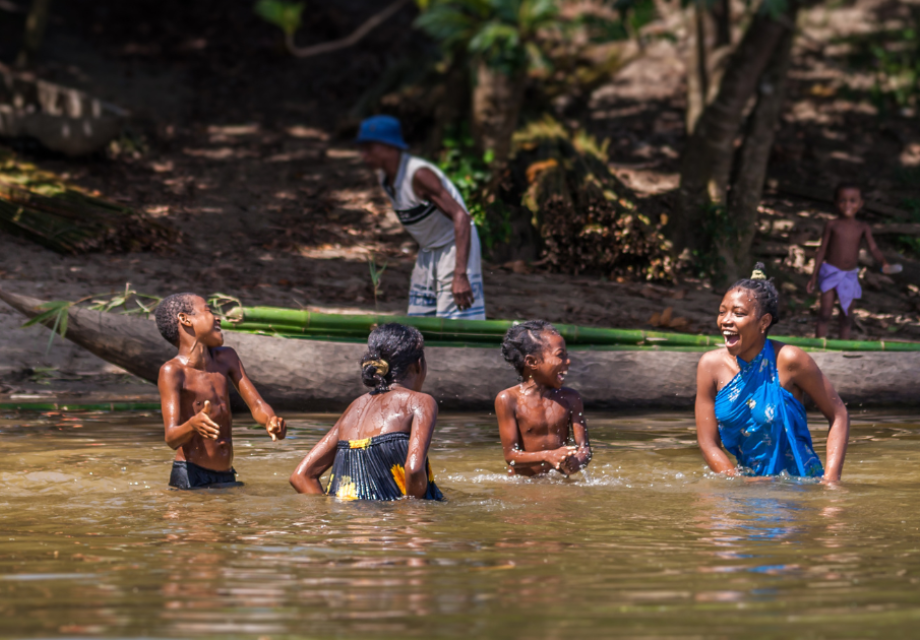Female genital schistosomiasis and HIV – what’s the link?
Laura Mundy
16 September 2022
Female genital schistosomiasis can make women and girls more vulnerable to HIV. But what it is and how can you avoid it?
What is schistosomiasis?
A parasitic infection caused by a worm called the blood fluke. Freshwater snails carry the worm, in the same way that certain mosquitos carry malaria parasites. When the worms get into the body they can affect the female genital area, causing sores. If this happens it’s known as female genital schistosomiasis (FGS).
How is FGS spread?
By touching freshwater sources that contain the worms, such as lakes, streams and rivers. Women and girls living in rural communities are most at risk of FGS because they often enter infected water to do chores like collecting water and washing, or to play, swim or fish.
When in the water, worms can burrow directly into your skin. Once inside the body the worms grow and lay eggs. When someone with schistosomiasis urinates (wees) or defecates (poos) in or near a freshwater source, parasitic eggs will enter the water and hatch into worms. These worms then go on to enter someone else’s skin.
How can I avoid FGS?
The best way to prevent FGS is to take regular preventative treatment to kill off any worms and stop the build-up of eggs. See the treatment question for more on this.
If possible, use safe, clean water and washing facilities and avoid washing, swimming or bathing in water where it is known infected snails live. Collect drinking water from a trusted water source such as a well or borehole, or use piped water.
Help stop the spread of the disease by not urinating (weeing) or defecating (pooing) into water which people use for bathing and collecting water, like rivers, lakes and ponds.
What are the symptoms of FGS?
The main symptoms of FGS include things like itching or a burning feeling on your genitals, vaginal bleeding and discharge, pain in your pelvis, vaginal ulcers and pain/bleeding during or after sex.
If left untreated, FGS can cause infertility (when you’re unable to get pregnant), miscarriage (loss of a pregnancy) and premature birth (when a baby is born too early). It can also cause unintentional urination (weeing) when coughing, laughing or jumping. And genital ulcers, and tumours or swelling in the vulva, vagina or cervix.
How is FGS diagnosed?
If you have symptoms and/or have been in contact with freshwater sources, you may be given treatment without being testing.
If you need and agree to an exam, a healthcare worker will look for unusual sores on your cervix or vagina. They may also ask you to urinate (wee) into a container.
The healthcare worker will use a large magnifying glass (a colposcope) or microscope to look for signs of the eggs. If they find signs of the eggs you will be started on treatment. You may need treatment even if no eggs are found.
How is FGS treated?
With a short course of medication called praziquantel, which kills the worms and eggs, and prevents new sores. It is a safe drug which is taken by millions of people each year. The earlier you start treatment the less chance there is of long-term complications.
Praziquantel should be taken once every six months if you use or go into contaminated or dirty water. It is safe to take even if you haven’t got symptoms.
Re-infection can happen if you come into direct contact with contaminated water again after taking treatment. But there is no limit to the number of times you can receive treatment.
What if I’m embarrassed to see a healthcare worker about FGS?
Lots of women feel embarrassed about having FGS, particularly as many of the symptoms can be confused with an STI, but having FGS is nothing to feel ashamed about. The earlier you start treatment the less chance there is of long-term complications.
Your healthcare worker is there to help you with any questions or worries you may have. They will explain how to take your treatment. You should also be offered a follow up appointment.
Can children get FGS?
Yes, FGS often starts in childhood. It’s possible to treat the infection in children, which prevents FGS from developing.
Children in some rural areas are given tablets to prevent infection while they are at school. This is standard care and should be done routinely at schools in areas where the risk is high.
The risk of developing severe FGS is greatly reduced if treatment is started and repeated in childhood, usually once or twice a year. So, it’s important to give permission for your child to have the treatment.
Can men get genital schistosomiasis?
Yes, men can get male genital schistosomiasis (MGS). The impact of genital schistosomiasis is more severe in women, but there is a serious lack of research into how MGS affects men and its connection to HIV. It’s important that men and boys are given preventative treatment too.
Am I more at risk of HIV if I have FGS?
Yes. HIV is spread more easily when there is an entry point for the virus to get into the body. FGS causes sores which can bleed during sex. This can provide such an entry point for HIV.
Some studies have found that women with FGS are 3-4 times more likely to also have HIV.
If you notice any of the symptoms of FGS or think you might have it, visit your healthcare provider. If they give you treatment for FGS, make sure you take it. This will lower your risk of HIV by healing the sores. And avoid having unprotected sex (without a condom) until your sores have healed.
Get our news and blogs by email
Keep up-to-date with all our latest news stories and blogs by signing up to the Be in the KNOW news digest.
